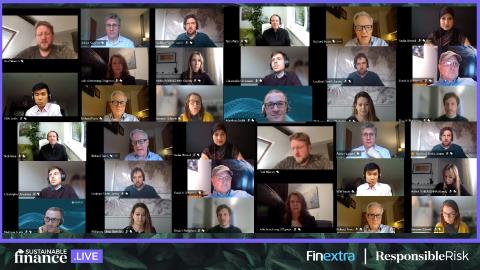Sustainable Finance Live: A Collaborative Workshop Series
This week, Finextra Research and Responsible Risk held the third installment of the Sustainable Finance Live workshop series, aimed at fostering collaboration in the ESGtech sector.
Attendees participated in sessions led by prominent figures in sustainability, spatial finance, risk management, and technology. These workshops were designed to facilitate hands-on learning, share best practices, and align priorities, ultimately creating a visual representation of the solutions discussed.
A staggering $47 trillion has been committed to sustainable finance, aligning with sustainability objectives like the UN Sustainable Development Goals (SDGs). However, the release of this capital is hampered by uncertainties arising from inadequate data, taxonomies, and robust reporting frameworks required by financial institutions.
Insights from Investors
Over two days, numerous stakeholders in sustainable finance gathered to rethink risk modeling. The first co-creation panel addressed the challenges related to short-term planning and the absence of proactive climate risk predictions. This has led to difficulties for investors in constructing viable business cases and accurately pricing risks.
Expert facilitators from organizations such as Elastacloud, S&P Global Ratings, EBRD, and PwC Space discussed strategies for integrating climate data into the financial analysis. Despite having access to asset-level databases and climate risk tools, a lack of standard aggregation rules remains a significant barrier.
Linking climate data with credit risk could provide insights into how environmental changes threaten credit quality. However, the pressing question is whether the market is prepared to utilize forward-looking models. The conversation also touched on a longstanding debate regarding whether investments in green bonds yield similar returns to traditional bonds, resulting in missed opportunities for many organizations.
Furthermore, the scientific nature of spatial data often alienates financial institutions. Therefore, creating a platform to aggregate diverse data sources is critical. The high dimensionality of data science poses its own challenges, necessitating robust collaboration among private and public sectors, academia, and industry. While there is consensus on the need for education, many suggested prioritizing the use of readily available satellite data.
Addressing Risks
In the second co-creation workshop, participants examined current risk assessment practices, which often rely on retrospective analyses of annual data that neglect non-financial metrics. This approach has resulted in a pricing gap that restricts capital flow to innovative sectors crucial for decarbonization and biodiversity protection.
Facilitators from ESG Treasury, WWF, and other leading organizations proposed a forward-looking risk framework with dynamic inputs capable of identifying carbon-intensive activities throughout supply chains. As banks focus on their exposure to climate-related financial impacts, they will need to evaluate their portfolios in light of evolving standards such as Basel III.
Panelists highlighted the need for standardized methods to assess transition and physical risks. Achieving shared value will require a unified infrastructure to compare and calculate risks across different assets.
The Role of Alternative Data
During the final co-creation workshop, facilitators from various organizations discussed the critical lack of accessible asset data, which hampers accurate pricing of ESG risks. They emphasized that environmental risks must be integral to corporate evaluations, yet the absence of standard pricing practices complicates this effort. Transforming alternative data into accepted mainstream information remains a significant challenge.
A potential solution is the establishment of a data marketplace that captures needs and value propositions while addressing data provision issues among asset owners and funders. However, ensuring data quality and credibility will be essential for its success. Some participants suggested the need for certifications to build trust, while others raised concerns about the profitability of maintaining datasets within commercial environments.
Finding a balance between incentivizing data sharing and respecting proprietary information is crucial, potentially requiring legal frameworks or encryption solutions to facilitate access while safeguarding data integrity.
Conclusion
In January 2021, Finextra and Responsible Risk will release a Visual Record summarizing the solutions and best practices identified during the co-creation workshops.
